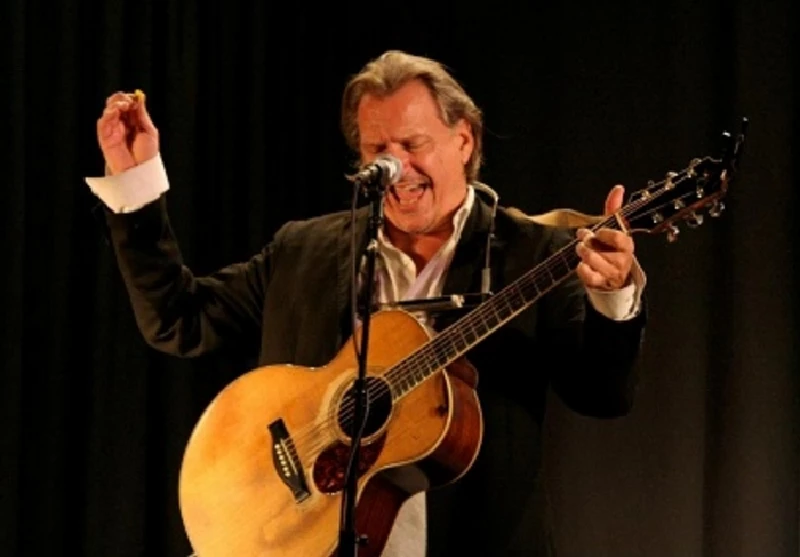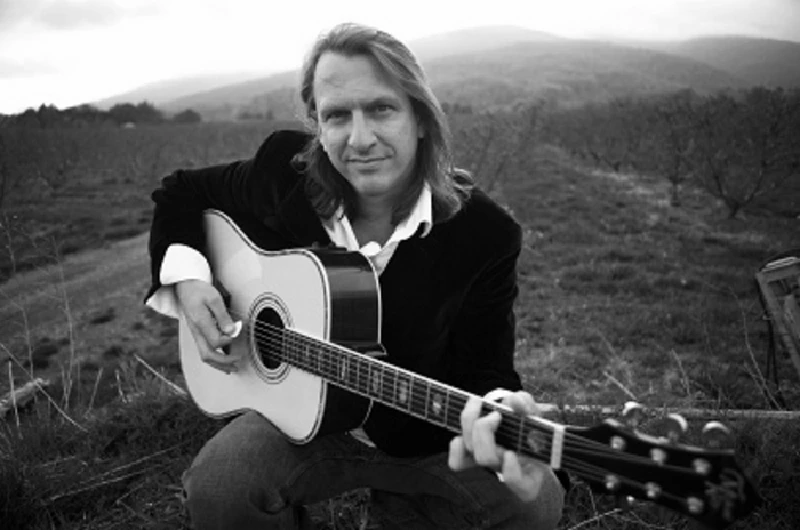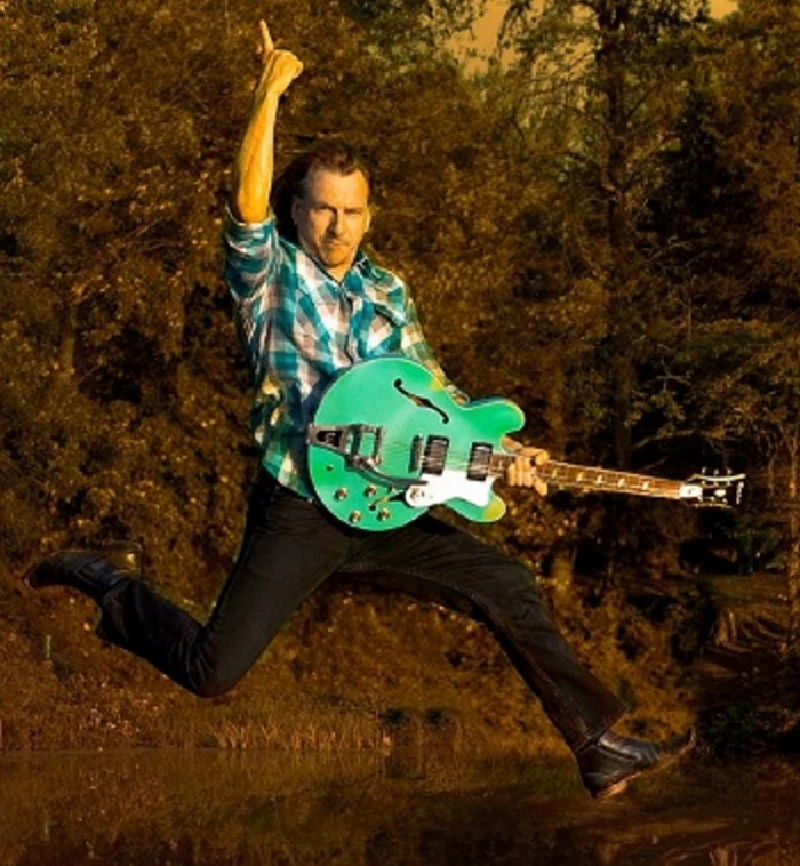Ellis Paul - Interview
by Lisa Torem
published: 27 / 8 / 2012

intro
Lisa Torem talks to Charlottesville based singer-songwriter Ellis Paul about the inspiration that Woody Guthrie has had on his song writing, and his fan-funded latest album ‘The Day After Everything Changed’
When Ellis Paul received a track scholarship to Boston College, performing folk music was the furthest thing from his mind, but then an athletic injury forced the Maine singer-songwriter to shift direction. Though he had played trumpet in high school and enjoyed Maynard Ferguson and Stan Kenton jazz charts, folk music had not yet fueled his passions, but he had to kill time while recovering, so he randomly picked up a guitar and began writing and writing and writing. After receiving his degree in 1987, Paul would become an important figure in the Boston School of songwriting, a style based on intelligent and imaginative lyrics, and he began to play open mics several times during the week at night, while working a day job teaching inner city kids, an experience that would likely provide insights later used in his career as a purveyor of “family” music. In the early 1990s he met Ralph Jaccodine, his future manager and together they founded Black Wolf Records. During the next decade, Paul would enjoy major exposure on the Windham Hill Records compilation, ‘Legacy II’ and meet Bill Morrissey, who introduced him to the works of Woody Guthrie, Mississippi John Hurt and Randy Newman, another life altering event. Paul became a die hard Guthrie enthusiast and, after meeting the iconic folksinger’s daughter, Nora, he was asked to perform at a tribute at Cleveland’s Rock and Roll Hall of Fame. His repertoire, thereafter, while mostly made up of originals would include a Guthrie cover and since then he is a frequent staple at Guthrie fests. In fact, he was even asked to finish writing a song that was found amongst lyric sheets in the Guthrie archives. Fourteen Boston Music Awards and seventeen albums later, including his latest CD, ‘The Day After Everything Changed’ which was fan funded, Paul continues to perform more than two hundred times per year and has developed an enviable fan base, who enjoy his poetic lyrics, sophisticated finger picking and ability to bridge tradition and contemporary styles, while keeping it real. A prolific writer, his work excels in a number of mediums, including popular American films and live performance, where he attracts all-ages audiences because of his onstage ease and everyman appeal. Many of his lyrics convey a strong admiration for nature and global awareness, but even love, when tackled, is communicated with a no-holds-barred authenticity. Paul discussed breaking into the music scene, the process of writing moving lyrics and his admiration for many of his peers in the business with Pennyblackmusic. PB: You were originally from Maine, Ellis, but after living in Boston you relocated to Charlottesville. How did you break into the music scene in both locations and how do the scenes differ? EP: Charlottesville is much smaller than Boston, but it’s a thriving college town that seems to have attracted a great group of talented musicians. We have our bigger name stars here as well - Dave Matthews, Mary Chapin Carpenter come to mind, but there is a serious crowd of late twenties to early thirties players - unbelievable players - more so out of the bluegrass realm, and they are good to go toe to toe with anyone in any town. Boston has a great deal of musical diversity and has always Been a great singer/songwriters town - though it has shifted into roots music more than when I was coming through. I feel as if I'm a part of both scenes, but really I live on a highway more than any town. PB: Fairport Convention was a group, which had enormous impact on the folk movement. You recorded with a former member, Dave Maddox. Did you two share the same musical ideas for the project? EP: Dave is an incredible player. I have worked with him a few times and I find that the best way to deal with these genius types is to let them hear the song and react according to their genius DNA - if I could imagine a part better than Dave, I’d buy a kit myself. I trust his mind will take the part to a better place than any brain of mine and if I need to nudge his ideas I would, but he is in command of his choices, and that has never proven necessary. PB: Ellis, you have a tattoo of Woody Guthrie on your right shoulder. Woody has clearly influenced your physical self, but how has his songwriting affected your cognitive self? What would you say to him if you could? EP: I'd thank Woody for his word play, his ideas that play between the lines, his commitment to visual imagery, his fight for art's sake, integrity's sake, the story's sake. I hope I have a touch of that in my songs. PB: ‘The Hero in You’ album included original songs about Ben Franklin, Jackie Robinson, Martha Graham and Nellie Bly – people who were all noteworthy Americans, but for different reasons. Can you explain the reason behind the album, the audience you were trying to reach and how you narrowed down the list of “heroes?” EP:'The Hero in You' was written to remind adults and introduce kids to a handful of the characters and heroes on which our country was built. With all the wars, corruption, and political bickering, I thought it would be a wise time to write about people who rise above their circumstances, who changed our country for the better. I wanted a random sample of heroes - men, women, a variety of races, well known people, unknowns…it’s a bit of a chocolate box really. PB: ‘The Hero in You’ followed 'The Dragonfly Races’, your first family album. What attracted you to the family music market initially and do you find writing songs for this audience more or less challenging than writing for adults? EP: My kids, Ella and Sofi, brought me to the idea of writing kids’ music. I don't think they are any easier or harder to write - I look at kids music as more of a canvas with bright colours and big paint brushes — the adult stuff is a wider,subtler colour pallet and a finer brush. But the final product has to capture the listener,and I want both parents and children to enjoy my family music. PB: Fans funded ‘The Day After Everything Changed’. Why did you decide to go this route rather than leave fund raising to a label? Would you go this route again?Also you co-wrote with Kristian Bush from Sugarland on this project. Can you take us through a few songs that you co-wrote and explain the collaborative process? EP: We raised nearly $100,000 from supporters of my music-- it was a surprise and amazing, and more of a budget than any label had spent on my music to date, but my management team and I discovered we are at the beginning of the learning curve as a label, and we learned some lessons about how to be effective and what not to do with the funding. We probably would do it, the whole fundraising thing again, though I'd love to partner with a label and hold on to the master recordings over time. Writing with Kristian is easy because he and I are friends and there is a fearless quality to throwing ideas out. We can’t embarrass ourselves. Sometimes he would come in with the idea, such as 'Lights of Vegas', and I wouldn't add too much - more cheerleading and offering a couple lines and images. Those roles were reversed in ‘Once Upon a Summertime’, and he proved to be a great editor on that one:changed the tree to a magnolia, and helped with the bridge. We wrote ‘Paper Dolls’ in an hour from scratch, and that was like a spontaneous forest fire, because I had a plane to catch. We just rode that one like a rollercoaster. It almost wrote itself. PB: This album has a disarming, otherworldly quality, especially as you lead us into the title song. Even this lyric: “It was like a hummingbird flew through the air between us bringing a promise from your lips to mine,” takes us to a distant place. Was this mostly about love or something else? EP: That song was written in a philosophical/aesthetic Japanese style called “wabi-sabi.” It's a about perceiving both beauty and aging, and fragility in something of value. I applied this philosophy to a relationship song. In the beginning,falling in love seems an act of nature and wonder. I like how you said “other worldliness” - that's where the humming bird image arrives –and the rest of the song is about rust and cracks and decay. PB: “You’re shaking the timbers/You’re rattling the leaves” is a line from ‘Annalee’. I hear the painter in you coming out. How does your visual sense impact your stories? EP: I love music and art - songwriting is painting with words and chords and melodies. It has to be a sensory experience like a moving picture - letting the details of the picture tell the story. I like how you said you 'hear the painter’ in these songs. I am at my best when I do this. PB: Ellis, you were a track star before steeping yourself in music. Was that a valuable experience, something you were able to use as inspiration? EP: My track days were fun – but it was hard work, and I'm happier now doing music and art. I learned perseverance, loneliness, patience, and practice from being an athlete, and all of those things have helped me in my musical journey. PB: On a number of your live albums, you are inspired by venues like Club Hassim, Eddie’s Attic, Alice’s Champagne Palace and Martyr’s Lounge. You perform a couple of hundred shows per year, so what made these clubs memorable? EP: These are cornerstone venue. They are important to my history and my memory banks. There are many more that I love too - these are my homes, and I would love a thimble of my ashes spread in each of them. That sounds weird. But it's true. PB: Besides performing, you wrote ‘Notes from the Road’ for Black Wolf Press in 2002. Was that endeavor as satisfying as getting out the guitar and writing? EP: I'm getting into art and painting, working posters for folk events all around the country. I'd like to get good at it right now. I am not so interested in writing a book. Someday, though, I would like to do a book of short stories and a novel or two, but for now just songs and painting. PB: What’s happening next on the road and in the studio? EP: I'm working on adult songs and Christmas songs this week! Hopefully two albums will be coming soon! PB: Thank you.
Picture Gallery:-


interviews |
|
Interview (2014) |
| Lisa Torem speaks to American singer-songwriter Ellis Paul, about his latest solo alabum 'Chasing Shadows', which, recorded in three studios, includes songs about American war veterans and Johnny Cash |
most viewed articles
current edition
Spear Of Destiny - InterviewRobert Forster - Interview
Fiona Hutchings - Interview
When Rivers Meet - Waterfront, Norwich, 29/5/2025
Carl Ewens - David Bowie 1964 to 1982 On Track: Every Album, Every Song
Brian Wilson - Ten Songs That Made Me Love...
Chris Wade - Interview
Pistol Daisys - Waterfront, Norwich, 29/5/2025
Credits - ARC, Liverpool, 17/5.2025
Nils Petter Molvaer - El Molino, Barcelona, 24/4/2025
previous editions
Heavenly - P.U.N.K. Girl EPBarrie Barlow - Interview
Boomtown Rats - Ten Songs That Made Me Love....
Oasis - Oasis, Earl's Court, London, 1995
Dwina Gibb - Interview
Beautiful South - Ten Songs That Made Me Love...
Sound - Interview with Bi Marshall Part 1
Manic Street Preachers - (Gig of a Lifetime) Millennium Stadium, Cardiff, December 1999
Trudie Myerscough-Harris - Interview
Serge Gainsbourg - Ten Songs That Made Me Love...
most viewed reviews
current edition
Peter Doolan - I Am a Tree Rooted to the Spot and a Snake Moves Around Me,in a CircleGarbage - Let All That We Imagine Be The Light
Vinny Peculiar - Things Too Long Left Unsaid
Little Simz - Lotus
John McKay - Sixes and #Sevens
Suzanne Vega - Flying With Angels
HAIM - I Quit
Vultures - Liz Kershaw Session 16.06.88
Billy Nomates - Metalhorse
Eddie Chacon - Lay Low
Pennyblackmusic Regular Contributors
Adrian Janes
Amanda J. Window
Andrew Twambley
Anthony Dhanendran
Benjamin Howarth
Cila Warncke
Daniel Cressey
Darren Aston
Dastardly
Dave Goodwin
Denzil Watson
Dominic B. Simpson
Eoghan Lyng
Fiona Hutchings
Harry Sherriff
Helen Tipping
Jamie Rowland
John Clarkson
Julie Cruickshank
Kimberly Bright
Lisa Torem
Maarten Schiethart